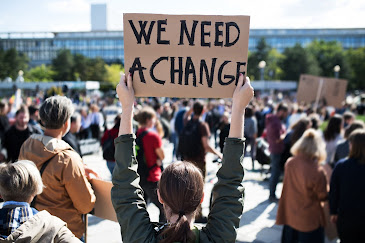How Can YOU Make a Real Difference in the World
Over the course of the last year, there has been political turmoil in Portland, to say the least: protests and riots erupted after an African American was wrongfully murdered by a police officer, and a pandemic pillaged millions of jobs and left thousands in extreme poverty. These matters, in addition to the already pressing issues of climate change, outrageous inequality, and preposterous political cynicism have filled the hearts of Portlanders with anger and confusion. It is more than fair to say, we are desperate for foundational government change. But, how can we make a difference? In this passage, we identify the most effective and easy ways citizens can make a real difference in the world.
1. Educate Yourself.
First and foremost, it is absolutely critical that you are open to learning and changing your opinion. Many people have stayed away from politics and important matters because they believe the learning is too strenuous, and they feel safe with what they already know. This is dangerous because the truth is constantly changing as we innovate and unravel more information in our world. For example, before the 1950s, smoking wasn’t considered bad for you. Nowadays if someone were to make that claim they would sound ridiculous and frankly ignorant. This is why it is important to spend time and effort familiarizing yourself with current events, modern science, and generally how the world works. Before passionately and single-mindedly throwing your opinion everywhere, take the time to truly research the problem at hand, why it’s happening, how’s it happening, where, when, and what. Never stop asking questions.
Now, all this poses a second threat: misinformation and pseudoscience. There is a popular method to determine if a website is trustworthy and truthful. This is called the CRAAP test. Check out the link below to learn how to determine if a source of information is one you should listen to
https://researchguides.ben.edu/source-evaluation
2. Directly Talk to Your Elected Officials
Did you know that you can contact your local government officials. This is probably the most powerful civic duty performable other than directly volunteering. Local and federal officials create policies that directly influence our lives, so it’s important we reach out and share our voice. Now, of course, this sounds mind-boggling. How can government officials answer everyone’s complaints? There are millions of citizens that want to share their opinion, and not all opinions are to be prioritized. You can call, email, or mail a letter to the elected officials of your state as well as the members of the house, like the president. Of course, these officials don’t directly answer the call, read the email or letter, but they have workers that do and transfer the message to them. There are important factors to know when formatting the message you want to send, who to send it to, and how to send it. First, understand some officials are much more likely to listen to you than others. The president probably receives millions of messages and listens to none, but local and state officials are much more likely to hear you out. Isaiah Akin, the deputy legislative director for Oregon’s Senator Ron Wyden, states that “Everything is read, every call and voicemail is listened to”... “We don’t discriminate when it comes to a phone versus e-mail versus letter.”. This quote is from back in 2016-2017 when they recorded about 6.4 million letters received by the senate alone. Remember to keep the message short and sweet. The more people who complain of a specific issue, the better chance the issue gets prioritized. Below are resources on where to find contacts to elected officials, how to format messages, and what types of messages have a better chance of being heard.
Where to find elected officials:
- https://www.usa.gov/elected-officials
- https://www.itsuptous.org/blog/get-heard-how-contact-your-elected-officials
How to format email, letter, and phone calls:
Phone:
Letters:
- https://www.nlacrc.org/home/showdocument?id=272
- https://www.ala.org/aasl/sites/ala.org.aasl/files/content/aboutaasl/aaslcommunity/quicklinks/el/Sample_Letter_to_Elected_Officials.pdf
Email:
- https://www.iaee.com/wp-content/uploads/2019/12/EMB-Writing-Elected-Officials_Nov19.pdf
- https://www.planning.org/advocacy/toolbox/emails.htm



Comments
Post a Comment